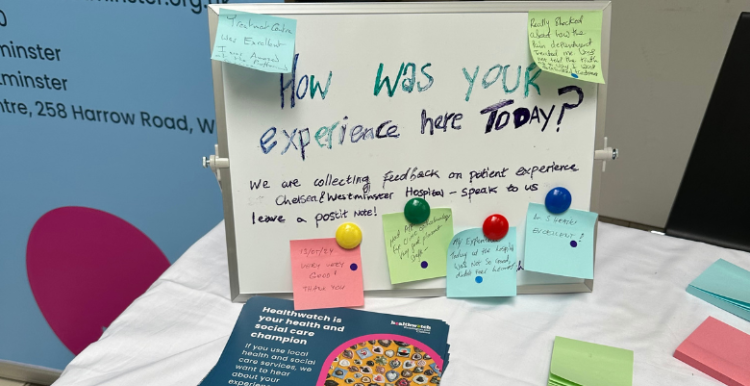How is Healthwatch Westminster making a difference?

Download the full report here
Our year in numbers
259 people shared their experiences of health and social care services, helping to raise awareness of issues and improve care
212 people came to us for clear advice and information about topics such as mental health and the cost-of-living crisis
11 reports were published sharing local perspectives on key issues and sharing our findings from Enter & View visits.
How we act on your experiences
Everything Healthwatch does is based on the needs of our local communities. We set our priorities based on what you tell us is most important and share your views with local service providers so they can improve. This year our work has focused on core issues such as mental health and access to primary care.
One of our biggest areas of work has been embedding patient voice into the Gordon Hospital consultation and scrutiny process. Through a patient experience report, support for individuals to speak at the scrutiny committee, and a consultation event open to our volunteers and wider network, Healthwatch Westminster and RBKC ensured that patient voice was at the heart of conversations to change the way local mental health services are delivered. We’ve supported more than 130 people to be part of the decision-making process and will continue to hold local mental health services to account.
The annual report also dives into our work improving mental health experiences of young people (18-25) across the bi-borough. 90% of participants told us they had experienced feeling lonely or isolated in the last 12 months, which suggests more needs to be done to improve the availability of mental health and wellbeing support in institutions, particularly for managing academic stress and career pressures.
Through the project, we encouraged more young people to discuss their concerns regarding their mental health and mental health services issues, thus creating a talking culture around what is often stigmatised. This has also influenced our Young Healthwatch network group, which consists of young people, to facilitate continuous engagement in monitoring existing and emerging priorities.
Download the full annual report to read more about this work, as well as the other important projects we ran throughout the year.
Where do we go next?
There’s still plenty to do in our mission to make sure local people can have a say about their health services and receive an excellent standard of care. Some of our priorities this year include mental health services for people experiencing homelessness, digital exclusion, and GP access. You can read more about the priorities we set earlier this year here. Or if you want to influence our future priorities, why not complete this short survey to tell us what you think about local services.


